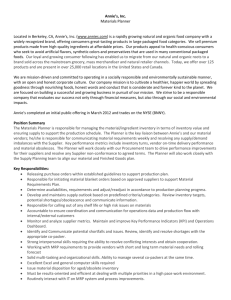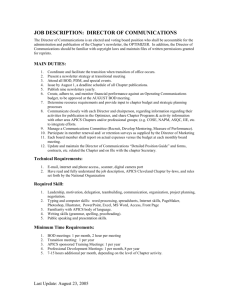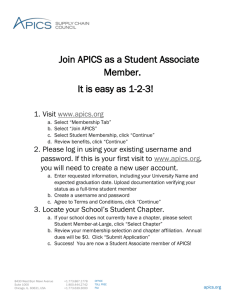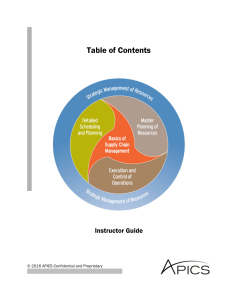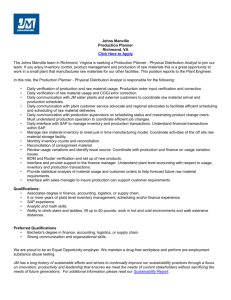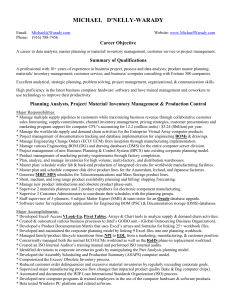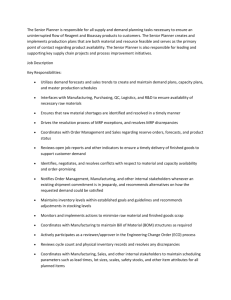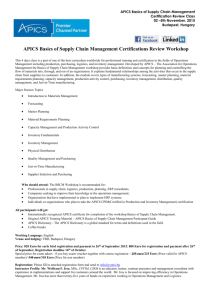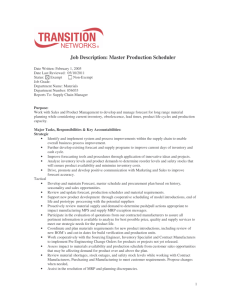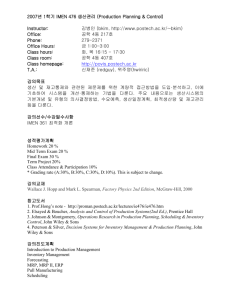buyer/planner competency model
advertisement
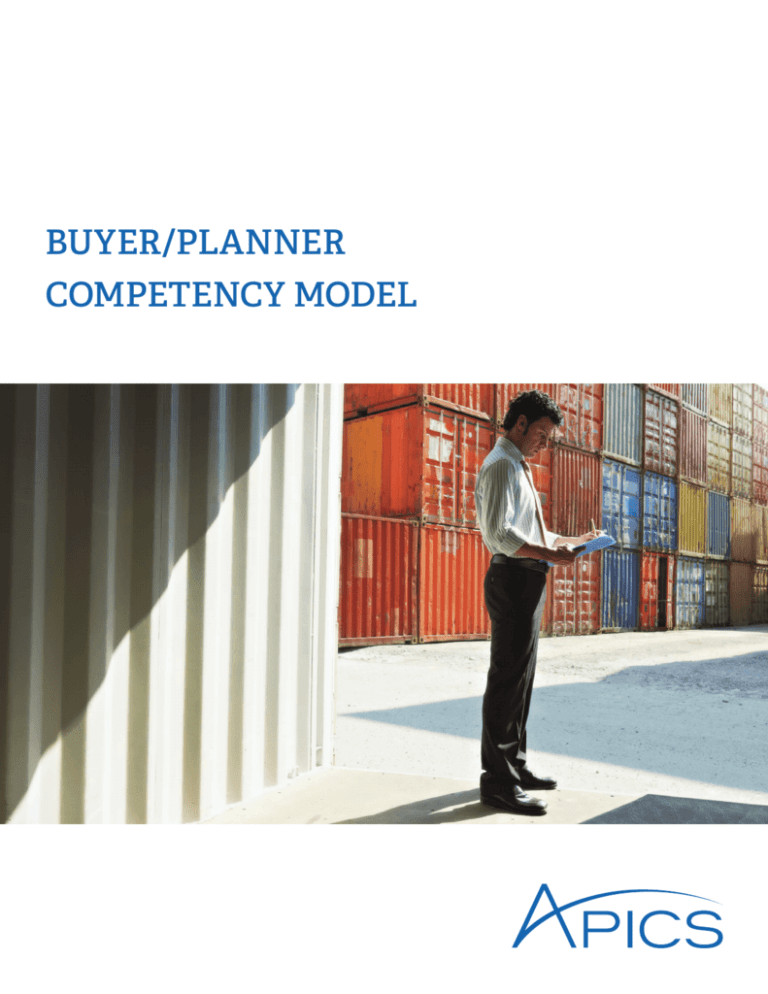
BUYER/PLANNER COMPETENCY MODEL INTRODUCTION Buyer/planners are buyers who also do material planning. This role is responsible for and manages purchasing, materials requirements planning, supplier relationship management, product life cycle and service design, among other things. APICS is the premier membership organization that provides education, certification and career development opportunities to supply chain professionals worldwide. The APICS Certified in Production and Inventory Management coursework and corresponding certification give professionals the knowledge and skills they need to succeed. Knowledge and skills, combined with professional experience, create the competencies required for individuals to excel in their careers and distinguish themselves in their field. APICS developed the Buyer/Planner Competency Model to guide individuals considering careers in buying and planning for buyer/planner professionals seeking to advance their positions and human resource managers who are hiring in this field. 2 APICS BUYER/PLANNER CAREER PACK VALUE THE PRIORITY SUSTAINABLE SUPPLY CHAINS: MAKING ABOUT THE MODEL The structure of the APICS Buyer/Planner Competency Model follows guidelines set by the Employment and Training Administration of the United States Department of Labor. The model is represented in a diagram on the next page for easy reference. The model is organized into tiers of competencies, with descriptions of the activities and behaviors associated with each competency. The Competency Model Clearinghouse defines competency as “the capability to apply or use a set of related knowledge, skills, and abilities required to successfully perform ‘critical work functions’ or tasks in a defined work setting.” In most cases, the competencies outlined in this model are adapted from the APICS Operations Management Body of Knowledge (OMBOK) Framework. ACKNOWLEDGMENTS The APICS Buyer/Planner Manager Competency Model was a research project undertaken by staff in the Professional Development Division of APICS. They were supported by APICS members and customers who participated in survey research. APICS staff used public domain information obtained from the Competency Model Clearinghouse (www.careeronestop.org) to create the model. 3 APICS BUYER/PLANNER CAREER PACK Occupation-related BUYER/PLANNER DIAGRAM Buyer/Planner Specific Requirements includes requirements such as certification, licensure and specialized educational degrees, or physical and training requirements for buyers/planners. ̥̥ Postsecondary education ̥̥ Association membership ̥̥ Certifications Buyer/Planner Knowledge Areas and Technical Competencies Profession-related represent the knowledge, skills and abilities needed by buyers/planners. ̥̥ Purchasing ̥̥ Scheduling techniques ̥̥ Material requirements planning ̥̥ Product and service design ̥̥ Service scheduling (days on and days off) ̥̥ Plant maintenance ̥̥ Inventory management ̥̥ Risk management ̥̥ Supplier relationship management ̥̥ Enterprise resources planning and manufacturing resource planning ̥̥ Advanced planning systems Operations Management Knowledge Areas and Technical Competencies represent the knowledge, skills and abilities needed by all occupations within operations management, including buyers/planners. ̥̥ Operations strategy ̥̥ Manufacturing process environments ̥̥ Standards (time measurement) ̥̥ Supply chain management ̥̥ Process improvement and six sigma ̥̥ Execution, planning, scheduling control ̥̥ Lean management ̥̥ Sustainability ̥̥ Enabling technology application Workplace and Leadership Competencies represent those skills and abilities that allow individuals to function in an organizational setting. Foundational ̥̥ Problem solving and decision making ̥̥ Teamwork and collaboration ̥̥ Accountability and responsibility ̥̥ Customer focus (internal and external) ̥̥ Planning and organizing ̥̥ Conflict management ̥̥ Supporting and training staff Academic Competencies are primarily learned in an academic setting, and include cognitive functions and thinking styles. ̥̥ Math, statistics and analytical thinking ̥̥ Reading and writing for comprehension ̥̥ Applied science and technology ̥̥ Supply chain fundamentals ̥̥ Foundations of business management ̥̥ Materials management fundamentals ̥̥ Operations and enterprise economics Personal Effectiveness Competencies represent motives and traits as well as interpersonal and self-management styles and generally are applicable to a number of industries at a national level. ̥̥ Awareness of the needs of others ̥̥ Integrity ̥̥ Continuous learning 4 APICS BUYER/PLANNER CAREER PACK ̥̥ Effective communication ̥̥ Interpersonal skills ̥̥ Creativity FOUNDATIONAL COMPETENCIES PERSONAL EFFECTIVENESS COMPETENCIES (TIER 1) Personal effectiveness competencies represent motives, traits, and interpersonal and self-management styles, and are applicable in any number of industries. Awareness of the needs of others ̥̥ Understand other business needs and goals. ̥̥ Have perspective into other points of view. ̥̥ Build rapport and credibility with colleagues. ̥̥ Anticipate needs and respond to concerns and conflicts. Integrity ̥̥ Demonstrate trustworthiness and professionalism with clients, peers and team members. ̥̥ Respond with consistency in situations that require honesty and candor. ̥̥ Avoid conflicts between work and personal interests or activities. Continuous learning ̥̥ Demonstrate an interest in personal learning and development; seek feedback from multiple sources about how to improve and develop; modify behavior based on feedback or self-analysis of past mistakes. ̥̥ Take steps to develop and maintain the knowledge, skills and expertise necessary to achieve positive results; participate fully in relevant training programs; actively pursue other opportunities to develop knowledge and skills. ̥̥ Anticipate changes in work demands and participate in assignments or training that address these changing demands; treat unexpected circumstances as opportunities to learn. ̥̥ Engage in career development by identifying occupational interests, strengths, options and opportunities; make insightful career planning decisions based on integration and feedback; seek out additional training to pursue career goals. 5 APICS BUYER/PLANNER CAREER PACK Effective communication ̥̥ Express information to individuals or groups that considers the audience and the nature of the information (for example, technical or controversial); speak clearly and confidently; organize information logically; speak using English conventions including proper grammar, tone and pace; track and react appropriately to audience responses; use eye contact and nonverbal expression effectively. ̥̥ Receive, attend to, interpret, understand and respond to verbal messages and other cues; pick out important information in verbal messages; understand complex instructions; appreciate the feelings and concerns behind verbal messages. ̥̥ Practice meaningful two-way communication by speaking clearly, paying attention, seeking to understand others, listening attentively, clarifying information and attending to nonverbal cues; respond appropriately. ̥̥ Influence others; persuasively present thoughts and ideas; inspire commitment and ensure support for ideas. Interpersonal skills ̥̥ Relate to clients, colleagues and team members. ̥̥ Maintain a positive, supportive and appreciative attitude. ̥̥ Actively listen to others and demonstrate understanding of different points of view. ̥̥ Create an open environment that encourages people to work together to solve problems and improve practices and services. ̥̥ Explore and resolve conflicts as they arise. ̥̥ Communicate clearly to avoid misunderstanding. Creativity ̥̥ Demonstrate intellectual curiosity about why things are the way they are; challenge the status quo. ̥̥ Change, elaborate, adapt and improve on ideas or those of others. ̥̥ Demonstrate a tendency toward action; materialize thoughts into products or services. 6 APICS BUYER/PLANNER CAREER PACK ACADEMIC COMPETENCIES (TIER 2) Academic competencies are primarily achieved in an academic setting and include cognitive functions and thought processes. Math, statistics and analytical thinking ̥̥ Practice applied mathematics in collecting and interpreting quantitative data. ̥̥ Demonstrate the ability to scrutinize and break down facts and thoughts into strengths and weaknesses. ̥̥ Develop the capacity to think in a careful and discerning way to solve problems, to analyze data, and to recall and apply information. Reading and writing for comprehension ̥̥ Understand what has been read; gather information from a text. ̥̥ Demonstrate an understanding of material read by forming opinions and sharing personal experiences. ̥̥ Apply the strategies of self-questioning, retelling, writing, summarizing, predicting and verifying, story mapping, role play and responsiveness. Applied science and technology ̥̥ Demonstrate an understanding of the factors that are considered important to the branch of knowledge or technology. ̥̥ Understand the use of technology and the interaction with life, society and the environment in conjunction with such subjects as industrial arts, engineering, applied science and pure science. ̥̥ Develop knowledge of specific tools and how they affect the ability to adapt to and control the environment. ̥̥ Demonstrate the ability to apply knowledge or understanding to meet a specific, recognized need. ̥̥ Possess knowledge that is sufficiently general, clearly conceptualized, carefully reasoned, systematically organized, critically examined and empirically tested with regard to the specific science or technology. Supply chain fundamentals ̥̥ Understand that supply and logistics is a system of organizations, people, technology, activities, information and resources involved in moving a product or service from supplier to customer. ̥̥ Possess basic knowledge of supply chain activities, including transformation of natural resources, raw materials and components into a finished product that is delivered to the end customer. ̥̥ Recognize the ways that supply chains link value chains. 7 APICS BUYER/PLANNER CAREER PACK Foundations of business management ̥̥ Understand all management activities carried out in the course of running an organization, including controlling, leading, monitoring, adjusting, organizing and planning. ̥̥ Analyze financial statements and explain the implications of standard financial ratios and all components of the balance sheet and income statement. ̥̥ Create interactive decision support models that demonstrate the sensitivity of outcome to multiple independent variables. ̥̥ Calculate project and organizational cash flow forecasts; present value investment comparisons and risk-adjusted return calculations. ̥̥ Demonstrate knowledge of visual presentation techniques including charting, histograms, flow sheets, and oral and written presentation techniques. ̥̥ Practice basic business communications. ̥̥ Understand fundamental organizational behavior. Materials management fundamentals ̥̥ Demonstrate knowledge of the operations management structure of the modern manufacturing and distribution company. ̥̥ Convert and communicate demand requirements for products and services into detailed plans and schedules for inventory acquisition. ̥̥ Calculate key inventory performance metrics such as turnover ratios, cost-benefit trade-offs, days of inventory on hand, labor productivity and inventory valuation. ̥̥ Calculate and apply the various costing and valuation methods to inventory management. ̥̥ Have detailed knowledge of manufacturing planning, master production scheduling, product definition, inventory control, materials requirements planning, capacity requirements planning, shop floor control, warehousing, transportation and purchasing business functions. ̥̥ Understand standard enterprise resource planning (ERP) and supply chain management (SCM) system technologies. ̥̥ Incorporate methods and techniques involved in lean and Just-in-Time (JIT) management. ̥̥ Implement new technologies. ̥̥ Be capable of performing human resource management functions. ̥̥ Participate in strategic planning and control development with senior management. ̥̥ Understand basic principles of sustainability, including reverse logistics, reworking product lines and cutting operational energy costs. 8 APICS BUYER/PLANNER CAREER PACK Operations and enterprise economics ̥̥ Understand the importance of and demonstrate the ability to take raw materials or knowledge and convert it into a product or service that has more value to the customer than the original material or data. ̥̥ Determine the success or failure rate of a business using financial accounting, incorporating terms and techniques including income, expense, cost of goods sold, gross margin, balance sheet, return on assets, inventory turns, capital asset management and cash management. ̥̥ Employ the technique of break-even analysis, which finds the break-even point — the volume at which revenues exceed total costs. ̥̥ Find the best operating level (BOL), the level of capacity a process was designed for. This is also the volume of output at which average unit cost is minimized. ̥̥ Use cost accounting systems to keep track of all costs of building products, labor, material, overhead and variances. These systems include activitybased costing (ABC) and cost analysis and control. WORKPLACE AND LEADERSHIP COMPETENCIES (TIER 3) Workplace competencies represent those skills and abilities that allow individuals to function in an organizational setting. Problem solving and decision making ̥̥ Practice goal-directed thinking and action in situations for which no routine solutions exist. ̥̥ Understand a problem situation and its step-by-step transformation based on planning and reasoning. ̥̥ Demonstrate the ability to choose between alternative courses of action using cognitive processes such as memory and evaluation. ̥̥ Demonstrate the ability to map processes of possible consequences of decisions, to work out the importance of individual factors, and to choose the best course of action. Teamwork and collaboration ̥̥ Demonstrate a commitment to the mission and motivation to combine the team’s energy and expertise to achieve a common objective. ̥̥ Understand the dynamics of effective teamwork in order to attain higher levels of performance. ̥̥ Demonstrate the ability to work as part of a tight-knit and competent group of people. ̥̥ Demonstrate a commitment to engage teams in other departments or divisions of the organization. 9 APICS BUYER/PLANNER CAREER PACK Accountability and responsibility ̥̥ Demonstrate a willingness to accept responsibility and accountability for one’s actions. ̥̥ Exhibit a moral, legal or mental accountability in areas of responsibility. ̥̥ Understand that these two workplace competencies are intertwined, and that both abilities must be present in order to succeed. Customer focus (internal and external) ̥̥ Understand this is an organizational orientation toward satisfying the needs of potential and actual customers. ̥̥ Ensure that the whole organization, not just frontline service staff, puts customers first. ̥̥ Ensure all activities, from the planning of a new product to production, marketing and after-sales care, are built around the customer. ̥̥ Understand that every department and every employee should share the same customer-focused vision. ̥̥ Practice good customer relations management and maintain a customer relations program. ̥̥ Demonstrate the ability to balance the needs of the organization and the needs of the customer. Planning and organizing ̥̥ Effectively plan what is to be achieved and involve all relevant staff members. ̥̥ Anticipate important or critical events, identifying resource requirements and assigning responsibility for specific work, including deadlines and performance expectations. ̥̥ Demonstrate the use of information-gathering techniques, analyzing situations and identifying implications in order to make correct decisions. ̥̥ Demonstrate the ability to monitor progress and to make changes as required. ̥̥ Ensure that staff is aware they will be accountable for achieving the desired results through planned program evaluation and individual performance appraisal. ̥̥ Ensure that staff is provided with the necessary tools to succeed. 10 APICS BUYER/PLANNER CAREER PACK Conflict management ̥̥ Demonstrate the ability to manage conflict by identifying and handling conflicts in a sensible, fair and efficient manner. ̥̥ Demonstrate skill in effective communicating, problem solving and negotiating with a focus on party interests. Supporting and training staff ̥̥ Understand the importance of facilitating ongoing professional development opportunities for staff. ̥̥ Assess training needs and identify means (for example, classes, mentoring, written materials) to fill skill gaps. ̥̥ Provide opportunities for staff to demonstrate leadership skills. ̥̥ Provide clear and meaningful performance evaluation. ̥̥ Encourage the development of skills that increase personal and departmental productivities. 11 APICS BUYER/PLANNER CAREER PACK PROFESSION-RELATED COMPETENCIES OPERATIONS MANAGEMENT TECHNICAL COMPETENCIES (TIER 4) Operations management technical competencies represent the knowledge, skills and abilities needed by all occupations within operations management, including distribution and logistics managers. Operations strategy ̥̥ Ensure the alignment of the materials management strategy with the business strategies driving sales, marketing, finance and manufacturing. ̥̥ Develop inventory and plant asset management strategy supportive of company investment and capital management plans. ̥̥ Demonstrate the ability to consistently deliver products and services to meet customer needs. ̥̥ Develop strategic objectives that focus on areas of quality, cost, flexibility, productivity and speed. ̥̥ Consistently search for methods to develop an agile and committed departmental workforce. Manufacturing process environments ̥̥ Demonstrate close understanding and practical knowledge of a company’s manufacturing processes and equipment capabilities. ̥̥ Encourage a close working relationship between manufacturing and materials management personnel. ̥̥ Develop materials storage and delivery processes supportive of manufacturing operations. ̥̥ Assist manufacturing with process improvement and lean initiatives. ̥̥ Assist manufacturing management in the development of meaningful productivity and performance measurements. ̥̥ Understand the influence of demand on manufacturing process design. ̥̥ Ensure processes conform to both the needs of the customer base and the characteristic of the product. ̥̥ Ensure the continuous availability of quality materials and finished components. ̥̥ Understand output of materials requirement planning (MRP), capacity management and advanced planning system technologies. 12 APICS BUYER/PLANNER CAREER PACK Standards (time measurement) ̥̥ Assist manufacturing engineering in the development of process productivity standards. ̥̥ Understand calculations for efficiency, utilization and productivity. ̥̥ Demonstrate the ability to calculate nominal and demonstrated productive capacities. Supply chain management ̥̥ Demonstrate the ability to manage the network of interconnected businesses involved in the ultimate provision of product and service packages required by end customers. ̥̥ Understand that supply chain management spans all movement and storage of raw materials, work-in-process inventory and finished goods from point of origin to point of consumption. Process improvement and six sigma ̥̥ Understand the systematic approach to closing of process or system performance gaps through streamlining and cycle time reduction; identify and eliminate causes of quality below specifications, process variation and non-value-adding activities. ̥̥ Maintain company processes that afford optimum operation and enhance the company’s quality management system. ̥̥ Demonstrate the ability to visualize the total process and aid in locating problem areas using process mapping, quality improvement and visualization tools to locate, quantify and correct root causes of problems. ̥̥ Perform periodic evaluations to maintain processes by gathering pertinent information such as problem symptoms from knowledgeable sources and carrying these through to the problems, potential causes and root causes of the problem. ̥̥ Hold gains in process improvements by establishing key performance measurements, benchmarking metrics and continuous process improvement initiatives to improve process quality on a continual basis. 13 APICS BUYER/PLANNER CAREER PACK Execution, planning, scheduling and control ̥̥ Determine the need for material and capacity to address expected demand, execute the resulting plans, and update planning and financial information to reflect the results. ̥̥ Plan the management function by defining goals and the tasks and resources needed to attain those goals. ̥̥ Schedule a timetable of events and decide when and where certain events will occur. ̥̥ Control and check errors, taking any corrective action so that deviations from standards are minimized and stated goals of the organization are achieved in a desired manner. Lean management ̥̥ Identify and reduce or eliminate waste in all areas of a supply chain. ̥̥ Calculate the total system cost of delivering a product or service to the customer. ̥̥ Develop systems that allow employees to produce results by: • Educating suppliers to create value for customers by streamlining processes in the value chain. • Using suppliers whose methods and core competencies will align with lean requirements and developing long-term relationships with them. • Reducing or entirely eliminating the cost of changing from one product or service to another. Sustainability ̥̥ Understand current industry and government regulations governing sustainability. ̥̥ Be able to calculate the carbon footprint of business processes. ̥̥ Develop processes that strive to eliminate waste. ̥̥ Incorporate renewable raw materials. ̥̥ Assemble an effective reverse logistics program. ̥̥ Pursue transportation alternatives to reduce energy and emissions. ̥̥ Utilize safe and reusable containerization. ̥̥ Pursue paperless documentation. ̥̥ Coordinate shipping and freight to use full truckloads. ̥̥ Convert outputs to inputs; recycle end products and components when possible. 14 APICS BUYER/PLANNER CAREER PACK Technology application ̥̥ Recognize that continuous process improvement is an accepted way of life in business and that few companies lack a continuing quality or process improvement effort. ̥̥ Implement improvement methods such as business process re-engineering, total quality management (TQM), six sigma, lean manufacturing and theory of constraints (TOC). ̥̥ Understand that technology and process functionality have an interconnected relationship and that each helps transform the other. ̥̥ Initiate process improvements that are enabled and supported by technology. BUYER/PLANNER KNOWLEDGE AREAS (TIER 5) Buyer/planner knowledge areas are broad knowledge areas that can be used as a basis for specifying more detailed knowledge areas required for work as a buyer/planner. Purchasing ̥̥ Establish specifications in terms of optimal quantity to purchase, quality required and the cost impact on budget. ̥̥ Select suppliers according to the type of product, quality provided by the supplier and the possibility of partnership. ̥̥ Negotiate contracts that include costs, warranties, delivery, handling, and penalties for late delivering or cost overruns. ̥̥ Manage the purchasing cycle, including generating requisitions, PO creation, PO follow-up, goods reception and final payment. ̥̥ Monitor supplier performance with a system that monitors, measures and provides feedback on supplier performance. ̥̥ Provide an uninterrupted flow of materials and services. ̥̥ Purchase products competitively. ̥̥ Keep inventory investment to a minimum. ̥̥ Develop people resources and information tools for productivity optimization. Scheduling techniques ̥̥ Understand how to implement and determine the appropriate scheduling technique to control capacity at work centers: • Finite scheduling • Infinite scheduling • Forward scheduling • Backward scheduling 15 APICS BUYER/PLANNER CAREER PACK Material requirements planning (MRP) ̥̥ Plan orders for production activity control and purchasing to implement and control. ̥̥ Ensure sufficient capacity to implement MRP by using capacity requirements planning. ̥̥ Use the master production schedule, product structure file, inventory record file and item master file for the MRP process. ̥̥ Construct a product tree bill of material when given parents and components. ̥̥ Calculate the requirements, receipts, orders and projected availability for a basic MRP record. Product and service design ̥̥ Understand the life cycle of your organization’s product or service and how the cycle stages relate to your function. For example, once a product reaches maturity, there is often a need to lower costs and price. Buyers may need to reevaluate supplier selection. ̥̥ Be able to provide input for concurrent product design and engineering processes. Service scheduling (days on and days off) ̥̥ Create service schedules that maintain capacity levels to meet anticipated demand. ̥̥Take into consideration employee skill mix, shift assignments and employee preferences. Plant maintenance ̥̥ Schedule maintenance of shop floor equipment. Inventory management ̥̥ Be capable of determining departmental inventory management strategies and objectives. ̥̥ Know how to set up an effective inventory control department. ̥̥ Know how to apply trade-off analysis to balance requirements of demand and supply. ̥̥ Understand the different classes of inventory (raw materials, WIP, finished goods, MRO, service parts, damaged and obsolete). ̥̥Understand the difference between independent and dependent demand inventory. ̥̥ Know how to define the five functions of inventory: cycle inventory, safety inventory, anticipation inventory, transportation inventory and hedge inventory. ̥̥ Know how to determine the elements of inventory decision costs such as fixed, variable, direct and overhead. ̥̥ Know how to calculate inventory carrying costs. 16 APICS BUYER/PLANNER CAREER PACK Inventory management (cont.) ̥̥ Know how to calculate manufacturing and purchasing costs. ̥̥ Effectively manage surplus and obsolete inventories. ̥̥ Understand the methods of valuing inventory: standard; first in, first out (FIFO); last in, first out (LIFO); average; and actual cost. ̥̥ Understand the difference between continuous and period review systems of inventory control. ̥̥ Effectively calculate the inventory required to restock products or parts with inventory models including: • Visual review • Two-bin inventory system • Periodic review • Order point • Time-phased order point (TPOP) • Just-in-Time (JIT) ̥̥ Effectively calculate safety stock for independent demand items. ̥̥ Be able to calculate the order quantity through the economic order quantity (EOQ). ̥̥ Maintain high inventory accuracy through various techniques including inventory audits, annual physical inventory and cycle counting. ̥̥ Generate reporting detailing inventory financial statements, turnover ratios, activity-based cost (ABC) analysis and inventory performance. ̥̥ Be aware of the latest electronic data collection technologies. ̥̥ Understand lean and JIT concepts and practices. ̥̥ Be able to set up and run a pull system of inventory control. ̥̥ Effectively calculate kanban card requirements. ̥̥ Develop kaizen event teams to remove inventory, process wastes and speed inventory throughput. Risk management ̥̥ Accurately identify risks that affect supply, transformation, delivery and customer demand. ̥̥ Effectively analyze the probability, control and impact of identified risks. ̥̥ Develop strategies for dual sourcing, buffering, forward buying and others that minimize financial impact uncertainties such as yields, timing, pricing and catastrophic events. 17 APICS BUYER/PLANNER CAREER PACK BUYER/PLANNER TECHNICAL COMPETENCIES (TIER 6) Buyer/planner technical competencies are specific to the role of buyer/planner. Supplier relationship management (SRM) ̥̥ Form partnerships with suppliers based on mutual business value principles: compatibility of interests, mutual need, openness and trust. ̥̥ Base your degree of involvement with a supplier on a continuum (from simple transactional to strategic alliance) of how much value-add the supplier creates. ̥̥ Develop partnerships with suppliers who provide a value proposition in areas including product development, operations integration and efficiencies, flexibility and others. ̥̥ Develop a supplier rating program that monitors and measures performance while providing timely feedback to the supply partners. Enterprise resources planning (ERP), manufacturing resource planning (MRP II), materials requirements planning (MRP) ̥̥ Be able to define ERP and MRP II software systems. ̥̥ Be able to explain the components of a modern ERP system. ̥̥ Have knowledge of the foundations of ERP systems. ̥̥ Understand the basic principles and operations of ERP systems. ̥̥ Understand the integration of company functions provided by an ERP system. ̥̥ Establish ERP planning procedures. ̥̥ Explain MRP II time-phased planning logic. ̥̥ Be capable of discussing the role of the bill of material in ERP. ̥̥ Describe how safety stock is managed in MRP. ̥̥ Understand the various types of order policies available in MRP order generation. ̥̥ Apply the application of independent and dependent demand to ERP. ̥̥ Calculate scrap and shrinkage factors into the MRP generation. ̥̥ Be capable of discussing and demonstrating the MRP gross-to-net explosion process. ̥̥ Evaluate the contents and calculations on the MRP grid display or report. ̥̥ Have knowledge of planning utilizing action messaging. ̥̥ Have knowledge of planning time fences in MRP. ̥̥ Be capable of defining the types of replenishment orders found in the MRP grid. ̥̥ Be capable of working with pegged requirements in MRP. 18 APICS BUYER/PLANNER CAREER PACK Enterprise resources planning (ERP), manufacturing resource planning (MRP II), materials requirements planning (MRP) (cont.) ̥̥ Know how to perform order rescheduling in MRP. ̥̥ Understand the various MRP output reports. ̥̥ Establish when MRP is to be generated. ̥̥ Have knowledge of detail capacity planning (CRP). ̥̥Have detailed knowledge of the CRP components (work centers, labor and machines, routings, setup times, run, standards and move times) necessary to run CRP. ̥̥ Have knowledge of how to increase or decrease capacity. ̥̥ Be able to use CRP to reschedule open and MRP-generated orders. ̥̥ Understand load versus capacity output reporting. ̥̥ Collaborate with functional departments to discuss and react to changes in demand. ̥̥ Understand ERP support for advanced planning systems (APS). Advanced planning systems ̥̥ Understand the output from APS. ̥̥ Have basic knowledge of advanced planning systems optimization techniques. ̥̥ Understand advanced planning relationships to MRP planning systems. ̥̥ Have the ability to develop simulation scheduling scenarios. 19 APICS BUYER/PLANNER CAREER PACK OCCUPATION-RELATED COMPETENCIES BUYER/PLANNER SPECIFIC REQUIREMENTS (TIER 7) Buyer/planner specific requirements include certification, licensure and specialized educational degrees, or physical and training requirements. Post-secondary education ̥̥ The majority of buyer/planner professionals hold post-secondary degrees — a bachelor’s or equivalent. ̥̥ While a number of buyer/planner professionals have degrees related to supply chain or operations management, the majority hold degrees in other fields, including but not limited to business, economics, engineering or liberal arts studies. Association membership Professional association membership ensures that the buyer/planner professional is able to link into a network of practitioners to share best practices, develop their careers and continue their professional education. There are a number of supply chain associations related to specific industries, including but not limited to: ̥̥ APICS ̥̥ Institute of Supply Management (ISM) ̥̥ Supply Chain Council (SCC) ̥̥ American Purchasing Society Certifications Once the professional is in the workplace, it is desirable to obtain a buyer/ planner-related certification. While there are a number of supply chain and operations management certifications related to specific industries, general certifications include: ̥̥ APICS Certified in Production and Inventory Management (CPIM) ̥̥ APICS Certified Supply Chain Professional (CSCP) ̥̥ American Purchasing Society Certified Purchasing Professional (CPP) 20 APICS BUYER/PLANNER CAREER PACK ABOUT APICS APICS is the leading professional association for supply chain and operations management and the premier provider of research, education and certification programs that elevate end-to-end supply chain excellence, innovation and resilience. APICS Certified in Production and Inventory Management (CPIM) and APICS Certified Supply Chain Professional (CSCP) designations set the industry standard. With over 37,000 members and more than 250 international partners, APICS is transforming the way people do business, drive growth and reach global customers. © 2014 APICS 21 APICS BUYER/PLANNER CAREER PACK
